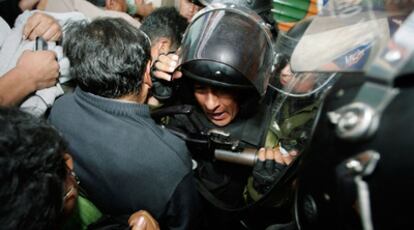Violent protests force Bolivian U-turn on removing fuel subsidies
Gasoline crisis became most critical moment in Morales' five years in power
Following days of protests, including roadblocks and demands that Bolivian President Evo Morales resign, the government went back on a decision to lift subsidies on gasoline that would have hiked prices at the pump by as much as 82 percent.
Just hours before New Year's Eve, Morales officially announced in a televised address that he would not go ahead with his measure as planned.
The crisis, known as the gasolinazo, was, according to some analysts, the most critical juncture the leftist leader has experienced in the five years he has been in power. He rescinded on the decree after holding hours-long meetings with his Cabinet, labor leaders and social organizations.
Even some inside of Morales' Movement toward Socialism (MAS) party were opposed to the sudden lifting of subsidies.
"I promised to govern by listening to the people. In the past few days, I listened and came to understand the recommendations and concerns made by the workers..." he said in a last-minute nationwide broadcast.
Just days before, Morales defended the lifting of subsidies on gasoline and diesel, saying it was necessary because smugglers had been taking the fuel to neighboring countries, such as Brazil, Paraguay and Argentina, and selling it at higher prices.
Of the $286 million the government has spent, $113 million had been lost to smuggling operations, the president said. The decree was first announced on December 26 and brought buses nationwide to a halt as the first signs of protests took place.
But by Thursday, the demonstrations became more violent in La Paz, Cochabamba and other Bolivian cities. At least 15 people were seriously injured and dozens of properties were destroyed.
In El Alto, a stronghold of Morales' indigenous supporters, protesters cut off roads leading to La Paz and burned down a toll booth. In the capital, La Paz, other demonstrators rushed a gate at the vice president's office, attacked businesses with rocks, and burned a Venezuelan flag. Many protesters believe that Venezuela's President Hugo Chávez, Morales' mentor, was behind the idea for the cancellation of subsidies.
Vice President Álvaro García Linera said that importation and the subsidizing of diesel and other fuels has eaten up a third of Bolivia's revenues. "Sooner or later we are going to have to close that wound," he told a radio station on Monday, adding that the government still believes that prices need to be raised.
Nevertheless, he said that this time around the government will sit down and discuss possible options with labor unions and social organizations.
As last week's disturbances took hold, Bolivians withdrew a total of $200 million from their bank accounts in just one day last Wednesday, after rumors spread that the government was planning on retaining deposits before announcing a devaluation of the currency, officials said on Monday.
Interior Minister Sacha Llorenti accused the opposition of fueling the rumors that led to the run on banks. According to Llorenti, businessman and opposition leader Samuel Doria Medina, who is president of the United National (UN), announced that he had heard rumors that the government was planning a major devaluation after the first day of the year.
"This statement is part of the financial terrorism that provoked the flight of some $200 million in capital," the minister said.
Jaime Navarro, a member of the UN party, said that the government was looking for "scapegoats" to punish those for the violent protests that took place last week.

Tu suscripción se está usando en otro dispositivo
¿Quieres añadir otro usuario a tu suscripción?
Si continúas leyendo en este dispositivo, no se podrá leer en el otro.
FlechaTu suscripción se está usando en otro dispositivo y solo puedes acceder a EL PAÍS desde un dispositivo a la vez.
Si quieres compartir tu cuenta, cambia tu suscripción a la modalidad Premium, así podrás añadir otro usuario. Cada uno accederá con su propia cuenta de email, lo que os permitirá personalizar vuestra experiencia en EL PAÍS.
¿Tienes una suscripción de empresa? Accede aquí para contratar más cuentas.
En el caso de no saber quién está usando tu cuenta, te recomendamos cambiar tu contraseña aquí.
Si decides continuar compartiendo tu cuenta, este mensaje se mostrará en tu dispositivo y en el de la otra persona que está usando tu cuenta de forma indefinida, afectando a tu experiencia de lectura. Puedes consultar aquí los términos y condiciones de la suscripción digital.




























































